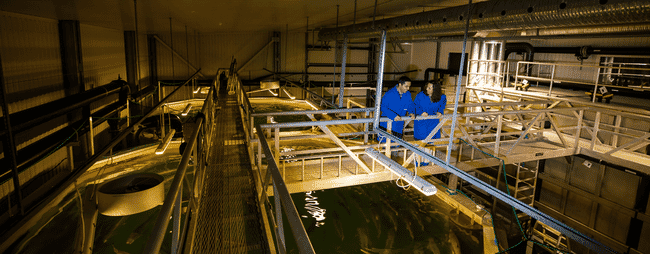The research station at Sunndalsøra, which specialises in aquaculture in closed and semi-closed facilities, is fully booked until the summer of 2022. As a result the institute plans to install 20 new tanks with separate recirculating systems during 2021.

© Nofima
“The Norwegian aquaculture industry is investing heavily in closed and semi-closed facilities. These investments are being made in terms of fry, smolt and fish farms. There is substantial optimism, but there are also technological and biological challenges. That’s why it’s only natural for us to facilitate even more research into RAS technology,” says Øyvind Fylling-Jensen, CEO of Nofima.
In the space of just a few years, the aquaculture industry has made major changes to the way that salmon is produced during the fry stage. Flow-through technology was the standard for smolt production until recently, but it is now primarily RAS that are being used in the aquaculture industry.
“The need for RAS research has increased in recent years, and is relevant to the entire aquaculture research field, including Nofima’s work in feeding and nutrition,” said Bente Torstensen, director of Nofima’s aquaculture division.
It is necessary to have a closed system for a range of issues – what is known as a single RAS system. In such systems, no tank shares the same water, which ensures good water quality and replicability during experiments.
Plans are also afoot to develop a new RAS secion at the Tromsø Aquaculture Research Station, which is owned by Nofima and UiT The Arctic University of Norway. Both at Sunndalsøra and in Tromsø, the respective county municipalities have agreed to provide significant investment funds. A total of around NOK 59 million is being invested at Sunndalsøra and in Tromsø.
“At Nofima, we need to ensure we are always at the cutting edge of recirculating systems. The industry is investing in different recirculating systems, which means that as a research institution we need to have the necessary infrastructure in place to ensure that our research is relevant,” said Fylling-Jensen.
Nofima heads up CtrlAqua, the Centre for Research-Based Innovation in Closed-Containment Aquaculture. The centre has an eight-year mandate (2015-2023) and is Nofima’s single biggest project. The project received very good evaluations at its halfway point in 2019, and has contributed to Nofima remaining in the vanguard of RAS research.
During the last round of allocations of research funding by the Research Council of Norway, Nofima received grants for two projects, worth a total of NOK 20 million, for knowledge building in relation to the production of fish in RAS systems. The farming of fish onshore is demanding, which is why extensive research is required over the course of the years to come.


